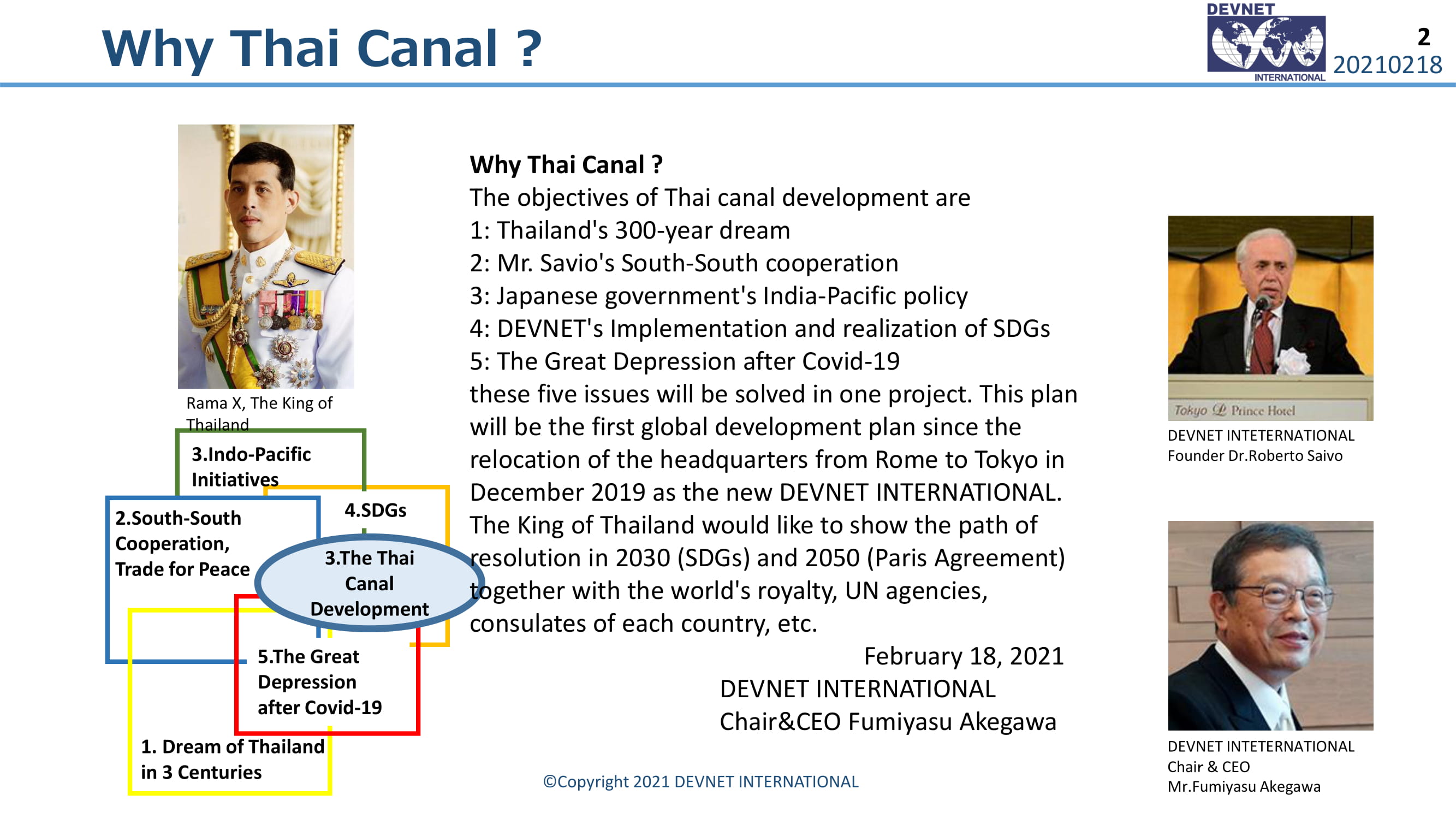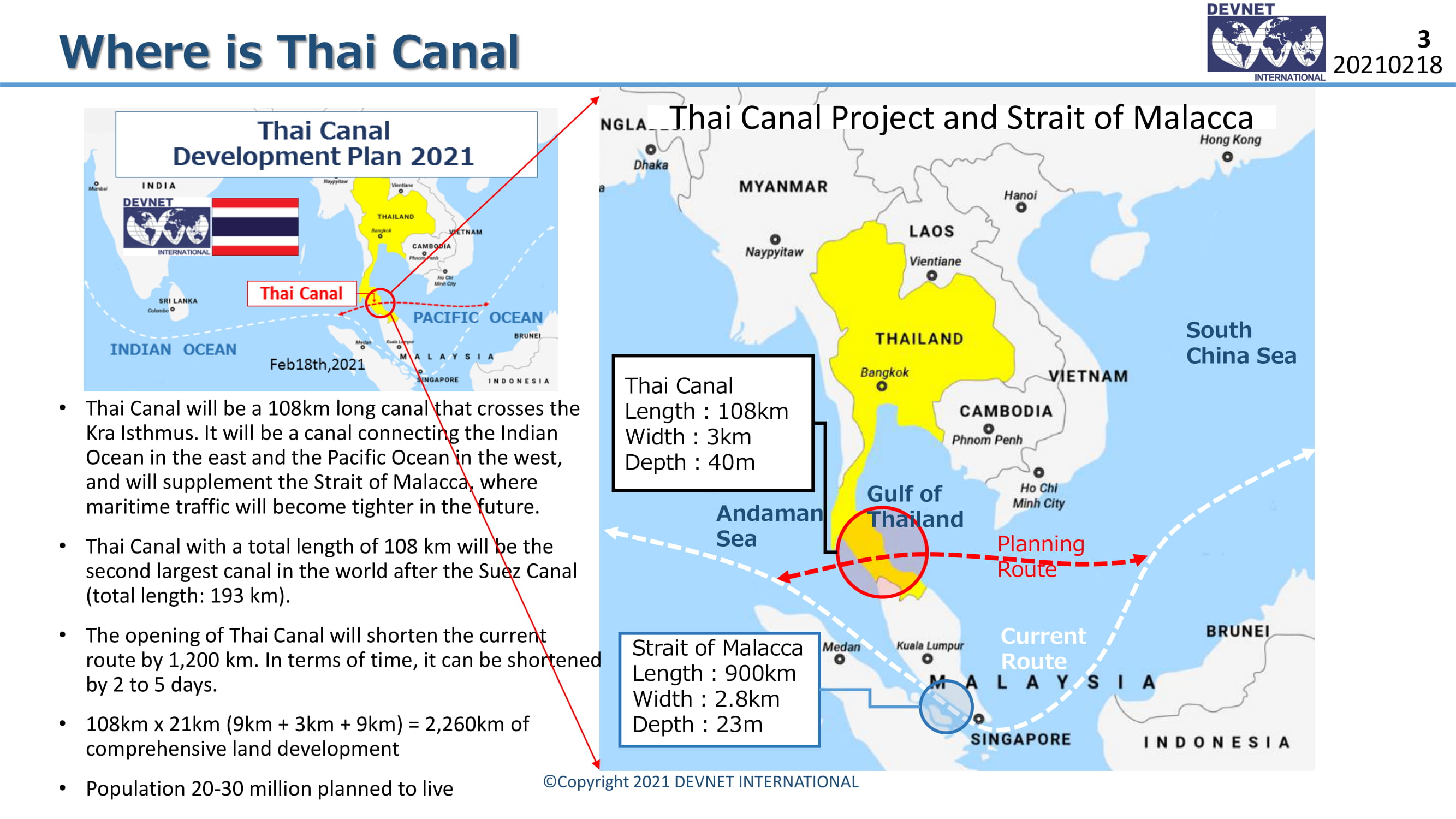2021 Development of The Thai Canal and establishment of DEVNET Thailand
I am Dr. Thanawan Bhookphan, newly appointed as a member of board of directors of DEVNET INTERNATIONAL on February 1st 2021, and at the same time appointed as the chief of the DEVNET Thailand branch. I am very delighted and proud of being involved in the national Thai Canal Project from the bottom of my heart.
I was born in the capital Bangkok and spent 30yeas in the USA. After earning a bachelor’s degree in mechanical engineering from the University of Arizona, earned a master’s degree and a doctoral degree from the Faculty of Industrial Engineering, so I could obtain the skill both on engineering and international business management. I worked for several global and excellent enterprises while I was studying in the university and after graduation, joined Motorola and worked for the engineering division to support NASA and contributed success of Apollo 14 and 15 missions.
After that I designed Space Shuttle mockups, radar, satellite, and mobile phone amplifier chips. After learned through precious experiences for a long time in the USA, I decided to return to Thailand to use my knowledge for further development of my homeland. Since then, I have been involved in many projects as an aide to the king of Thailand, including artificial rainfall, telecommunications, more recently from waste to energy, and green technology-related development, including solar energy.
King Bhumibol aimed to rescue Thai farmers suffering from drought in the “Thai Royal Rain Making Project“, November 1955. At that time, more than 82% of Thai farmland relied on natural rainfall, and many Thai farmers were suffering from water shortages. After that, on July 20, 1969, artificial rainfall was implemented in Khao Yai National Park, and in 1971, an artificial rainfall research and development project was established within the Ministry of Agricultural Cooperatives of Thailand.
While most of Thailand’s land is suffering from water shortages, in the capital Bangkok, land subsidence due to excessive pumping of groundwater is worsening year by year, and inundation damage is becoming more serious. According to the World Bank’s report, some parts of the cities (40%?) may be submerged by 2030. Today, the problem of groundwater overdose is a common issue in ASEAN metropolises. In this background, I established “Thanawan Bhookphan Relief Foundation” to support the Thai Red Cross Society in the event of a flood in Thailand.
In addition, my team has contributed to the success of northern agricultural projects and cold water fruit plantation royal projects using related technologies to reduce poverty in Thailand. I also work as a consultant for government agencies and private organizations, while focusing on the development of telecommunication systems in Thailand. I established Rungakeraya Engineering Company Limited (RA) to build a base station for wireless networks. In addition, my team is working on a number of projects, including a coal project in Myanmar, the construction of biomass power generation to address environmental issues, and the introduction of other advanced technologies.
In this comprehensive development of the Thai Canal, all the projects knowhow proceeded until now will be utilized toward “sustain- able city development”. Above all, I would like to practice the theory of “satisfied economics” based on Buddhist principles. This began after King Bhumibol proposed a self-sufficient economy as a way to save Thailand from the Asian financial crisis in 1997. All Thais wanted to live an edible life by their own economy. The commandment against greed, which is also called the “Sufficiency Economy” is at the core. Originally, the meaning of the economy is “activities to meet the demand of each household”, and it does not unnecessarily compete for large and small scales.
Rather than creating a huge city where everything is integrated into one, by connecting and aggregating self-sufficient small economic zones, we will create a metropolitan area that is highly energy efficient and resistant to disasters. Comprehensive the Thai Canal plan aims to develop a comprehensive city that anticipates the future of 2050, in collaboration with the city of Phuket, which is being developed as a tourist city, and with the smart cities promoted in 100 cities throughout Thailand. Currently, many large-scale infrastructure projects are being constructed in parallel throughout the Kingdom of Thailand, and will be completed one after another after 2024. The Thai Canal development must be the final settlement of those large-scale developments. The establishment of the DEVNET Thailand branch is just ready to launch.
Upon completion, the project will be handed down to posterity as a historic achievement of King Maha Vajralongkorn.




